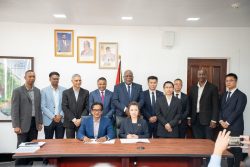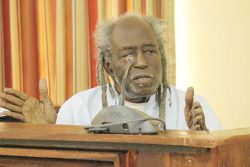By Raphael John-Lall
Trinidad and Tobago Guardian – Local business leaders all agree that becoming proficient in the use of the Spanish language is important as T&T’s businesses seek to enter Latin American markets.
Local companies like Sacha Cosmetics, Vemco and Carib Brewery have successfully entered the Latin American market over the past few years.
Former Central Bank Governor Winston Dookeran, who also served as Finance Minister in the People’s Partnership administration over the last 40 years told the Business Guardian, he studied Spanish while at the Central Bank and foresaw that it would be an important tool for business and regional trade.
Dookeran sent the Business Guardian an email from the Spanish-speaking country of Chile, where he is speaking at a high-level forum hosted by the United Nations Econo-mic Commission for Latin America and the Caribbean (ECLAC).
“I foresaw the importance of learning Spanish in today’s world. T&T’s foreign thrust in the Latin American Development Bank and observer status in the Pacific Alliance grouping are but clear examples of how Spanish has become a commercial language for our future”
He said it is also a diplomatic language, more so now because of the shifts in global politics and in Latin America too.
“Culturally, T&T has a strong Spanish presence over the years and a good neighbour to countries of the region. So, my insight then to enroll in the Venezuelan Embassy programme proved dead right. I urge all business leaders to do so.”
Spanish for business
CEO of T&T Coalition of Services Industries (TTCSI) Vashti Guyadeen told the Business Guardian in light of their ongoing GoGlobalTTServices initiative, she strongly believes that learning Spanish is a crucial element for any businessperson seeking to enter the Latin American market.
“Learning Spanish not only facilitates communication, but also demonstrates genuine respect for potential partners, inves-tors, and clients by showing an appreciation for their language and culture. Countless successful entrepreneurs have recognised the importance of learning a foreign language to improve their networking capabilities and establish productive relationships with decision-makers. For instance, Mark Zuckerberg and Jan Koum, co-founder of WhatsApp, are prime examples of how language proficiency can boost business success,” said Guyadeen.
She said not being able to learn Spanish will continue to be a barrier to business in Latin America if the business community does not make the effort to learn the Spanish language.
“Business people seeking to enter the Latin American market can take several steps to overcome language and cultural barriers. While translation apps are widely used, they cannot replace the actual understanding of the language. Therefore, it is crucial to invest in language learning, particularly Spanish, to gain a competitive edge over other businesses,” Guyadeen said.
She added, “While technology can facilitate communication, it should not be relied upon as a quick-fix solution. Instead, businesses should prioritise building long-term relationships with potential partners, clients, and investors in Latin America, and learning their language is a critical component of this effort.
“Moreover, understanding the cultural nuances and business practices of the Latin American market is equally important to successfully navigate the region’s diverse and complex business environment.”
She also spoke about what the TTCSI is doing to help local companies break into Latin American and other foreign markets.
“Under the GoGlobal-TTServices brand, the TTCSI has developed a range of programmes to equip service providers and firms with the necessary tools to expand into new markets. The Gateway to Trade export accelerator programme is a key initiative aimed at producing a cohort of 100 globally competitive services firms by 2026. By supporting local businesses to venture into new markets, this initiative is expected to drive economic growth and job creation.
Makes business easier
In a statement to the Business Guardian, ExporTT, which is charged with helping non-energy companies break into international markets, said it is recommended that companies have Spanish-speaking staff to handle transactions with the Latin Ameri-can market. However, it is not mandatory.
“Some Latin American businessmen do speak English but in cases that they do not, a translator/ interpreter can be hired to facilitate communication. Having a Spanish-speaking person on staff would make this process much smoother and reduce the possibilities of miscommunication.”
ExporTT also said from 2018 to present, the agency has facilitated trade missions and trade shows that assisted over 50 unique companies in making connections to buyers/clients in Latin American markets such as Colombia, Cuba, Panama and Costa Rica.
“Over that same period, through our Doing Busi-ness seminars, our Research and Opportunity Unit has provided market intelligence to over 100 companies on entry requirements, trends, opportunities and challenges in entering the Latin America market.”
ExporTT also said that language differences should not be seen as a barrier as there are ways to facilitate communication with potential buyers/ clients in Latin America such as through an interpreter etc.
“Through exporTT’s co-financing service and based on established criteria, companies can get financial assistance in covering 50 per cent of the costs of translation of export-related documents, trade show participation and label design modification. Other market-entry activities such as product testing, IP registration, shipping of samples and website development are also covered.”
ExporTT said that based on the applicant’s business size, see below the maximum amounts that may be approved:
-Small – $60,000 per fiscal year (paid to supplier)
-Medium – $55,000 per fiscal year (reimbursable)
-Large – $50,000 per fiscal year (reimbursable)
60 years of Spanish-language training
Venezuelan Ambassador Álvaro Sánchez Cordero said over 50,000 T&T nationals have been trained to speak Spanish at the Embassy over the past 60 years and they have contributed to the field of business as well as other sectors.
“Indeed, several of those 50,000 have contributed widely to the development of T&T in areas such as tourism, education, trade, banking, energy, aviation and communications, among other fields. Hence, we can confidently say that Venezuela has been – and will always be – supporting T&T to achieve its goals while fully engaging in cultural and educational co-operation.”
Sánchez delivered his address last week at the Venezuelan Embassy, Victoria Avenue, Port-of-Spain as it celebrated the 60th anniversary of the establishment of the IVCC (Venezuelan Institute for Culture and Co-operation) in T&T.
The IVCC has taught Spanish, Venezuelan culture and music, mainly cuatro and mandolin, to more than 50,000 T&T nationals over the past 60 years.










